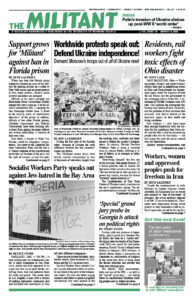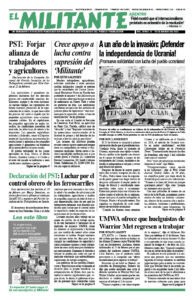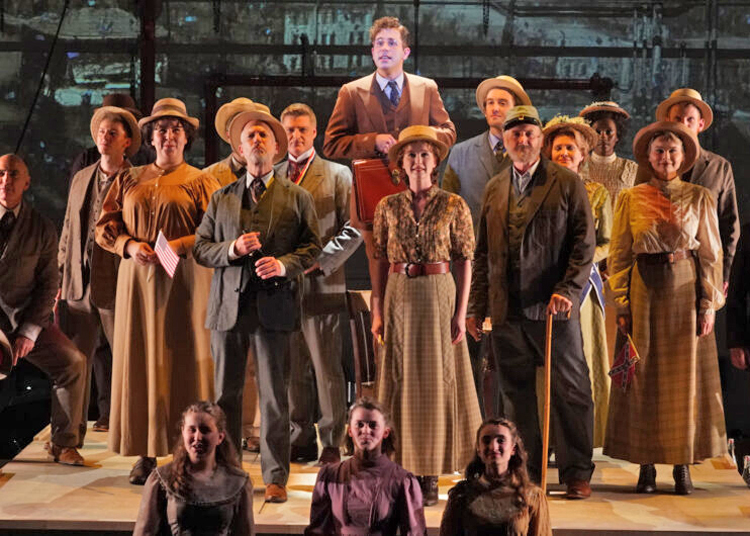NEW YORK — On Feb. 21 about a dozen ultrarightists showed up outside the Tony Award-winning Broadway musical “Parade” to hold a Jew-hating protest, targeting the play’s central figure — Leo Frank. Frank, a Jewish factory manager at an Atlanta pencil factory and president of the Atlanta chapter of B’nai B’rith, was framed up on charges of raping a 13-year-old worker and lynched by a Jew-hating mob over a century ago.
“Parade” producers and the actors and their union strongly condemned the antisemitic action.
This is a “reminder of why we’re telling this particular story,” said Ben Platt, who plays Frank. “And it made me feel extra, extra grateful to be the one that gets to tell this particular story and to carry on the legacy of Leo.”
Frank was convicted in August 1913 of the rape and murder of Mary Phagan in the factory. He appealed his conviction all the way to the U.S. Supreme Court, saying his constitutional rights had been violated, but the justices ruled 7 to 2 against him.
His trial was held amid an orgy of Jew-hatred. Mobs gathered each day to hoot, holler and threaten violence if he wasn’t convicted. Although there was substantial evidence a Black worker at the factory committed the crime, officials badgered him into implicating Frank as the killer.
In response to Frank’s trial and conviction, the Anti-Defamation League was founded in Chicago in 1913 with a mission that worked to mobilize support for him. They declared they would work, “to stop the defamation of the Jewish people and to secure justice and fair treatment to all.”
Pointing to the violations of due process at the trial, and the lynch-mob threats, a nationwide campaign urged his death sentence be thrown out and a new trial scheduled.
The state legislatures of both Texas and Tennessee asked for his life to be spared.
A Jew-hating campaign was mobilized to call for Frank to be put to death. Its central leader was Tom Watson, a well-known former populist turned white supremacist.
“Jew money has debased us, bought us, and sold us — and laughs at us,” Watson wrote in his magazine, attacking the campaign for Frank’s life. “Let the rich Jews beware! The next Jew who does what Frank did is going to get exactly the same thing that we give to Negro rapists.”
To add teeth to his threats of mob action, Watson wrote, “Another Ku Klux Klan may be organized to restore HOME RULE.”
Despite the antisemitic outcry, Georgia Gov. John Slaton commuted Frank’s sentence to life imprisonment in June 1915. Two months later a mob of 25 armed men, including a state legislator, judge and former governor, kidnapped Frank from his state prison cell with no opposition from the jailers, drove him over 100 miles to Marietta, Georgia, and lynched him. Thousands turned out.
In the September 1915 edition of Watson’s Jeffersonian magazine, he called for a revival of the Klan, which had disbanded in 1869. Two months later a group met atop Stone Mountain outside of Atlanta to relaunch the new Klan.
In 2002 a special exhibition was mounted in Pittsburgh, entitled “Without Sanctuary: Lynching Photography in America.” A Militant article about it by Omari Musa detailed the thousands of Blacks and others who were lynched. It included a picture of Leo Frank, noting his lynching “marked the KKK as being not only anti-Black, but anti-Semitic as well.” He could have added, anti-Catholic too.
The Georgia State Board of Pardons and Paroles posthumously pardoned Frank in 1986, though it did not make a judgment on his innocence.
There is renewed interest in this case today, and in recent antisemitic attacks. The Georgia Historical Center erected a marker commemorating Frank in 2008. In 2018, the first national anti-lynching memorial was placed at the site. The next year the district attorney in Fulton County created a panel to reinvestigate the case.
Jew-hating mobilization
“You want the truth about who you’re going to see tonight,” yelled one of the rightists to those entering the Bernard B. Jacobs Theatre, “You’re paying $300 to go f–king worship a pedophile.” Others chanted, “[Leo Frank is] a Jewish pedophile.”
The Jew-haters also handed out flyers slandering the Anti-Defamation League, saying it was established “to protect a Jewish child murdering pedophile Leo Frank.”
“If there is any remaining doubt out there about the urgency of telling this story in this moment in history,” the show’s producers said in a statement, “the vileness on display tonight should put it to rest.”
“We condemn the demonstration in the strongest possible terms,” the Actors’ Equity Association, the union of stage actors and managers, said. “‘Parade’ tells an important story of what happens when anti-Semitism and other kinds of hatred are allowed to grow unchecked.”


